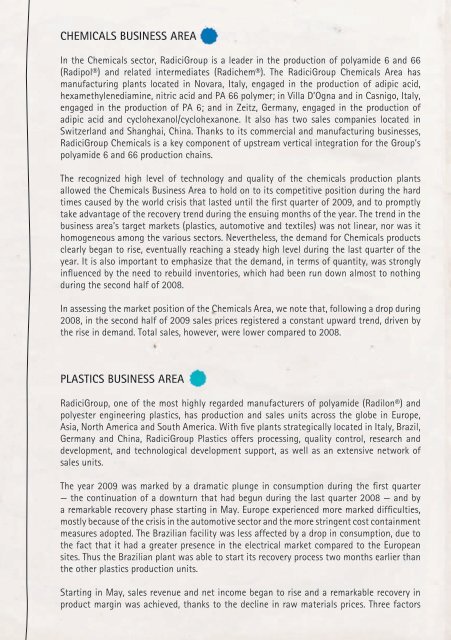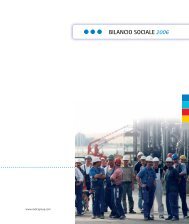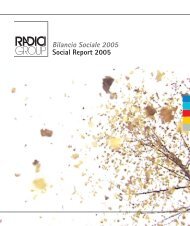2009 SUSTAINABILITY REPORT
2009 SUSTAINABILITY REPORT
2009 SUSTAINABILITY REPORT
Create successful ePaper yourself
Turn your PDF publications into a flip-book with our unique Google optimized e-Paper software.
CHEMICALS BUSINESS AREA<br />
In the Chemicals sector, RadiciGroup is a leader in the production of polyamide 6 and 66<br />
(Radipol®) and related intermediates (Radichem®). The RadiciGroup Chemicals Area has<br />
manufacturing plants located in Novara, Italy, engaged in the production of adipic acid,<br />
hexamethylenediamine, nitric acid and PA 66 polymer; in Villa D’Ogna and in Casnigo, Italy,<br />
engaged in the production of PA 6; and in Zeitz, Germany, engaged in the production of<br />
adipic acid and cyclohexanol/cyclohexanone. It also has two sales companies located in<br />
Switzerland and Shanghai, China. Thanks to its commercial and manufacturing businesses,<br />
RadiciGroup Chemicals is a key component of upstream vertical integration for the Group’s<br />
polyamide 6 and 66 production chains.<br />
The recognized high level of technology and quality of the chemicals production plants<br />
allowed the Chemicals Business Area to hold on to its competitive position during the hard<br />
times caused by the world crisis that lasted until the first quarter of <strong>2009</strong>, and to promptly<br />
take advantage of the recovery trend during the ensuing months of the year. The trend in the<br />
business area’s target markets (plastics, automotive and textiles) was not linear, nor was it<br />
homogeneous among the various sectors. Nevertheless, the demand for Chemicals products<br />
clearly began to rise, eventually reaching a steady high level during the last quarter of the<br />
year. It is also important to emphasize that the demand, in terms of quantity, was strongly<br />
influenced by the need to rebuild inventories, which had been run down almost to nothing<br />
during the second half of 2008.<br />
In assessing the market position of the Chemicals Area, we note that, following a drop during<br />
2008, in the second half of <strong>2009</strong> sales prices registered a constant upward trend, driven by<br />
the rise in demand. Total sales, however, were lower compared to 2008.<br />
PLASTICS BUSINESS AREA<br />
RadiciGroup, one of the most highly regarded manufacturers of polyamide (Radilon®) and<br />
polyester engineering plastics, has production and sales units across the globe in Europe,<br />
Asia, North America and South America. With five plants strategically located in Italy, Brazil,<br />
Germany and China, RadiciGroup Plastics offers processing, quality control, research and<br />
development, and technological development support, as well as an extensive network of<br />
sales units.<br />
The year <strong>2009</strong> was marked by a dramatic plunge in consumption during the first quarter<br />
— the continuation of a downturn that had begun during the last quarter 2008 — and by<br />
a remarkable recovery phase starting in May. Europe experienced more marked difficulties,<br />
mostly because of the crisis in the automotive sector and the more stringent cost containment<br />
measures adopted. The Brazilian facility was less affected by a drop in consumption, due to<br />
the fact that it had a greater presence in the electrical market compared to the European<br />
sites. Thus the Brazilian plant was able to start its recovery process two months earlier than<br />
the other plastics production units.<br />
Starting in May, sales revenue and net income began to rise and a remarkable recovery in<br />
product margin was achieved, thanks to the decline in raw materials prices. Three factors<br />
were responsible for the comeback: consumption growth with corresponding sales growth,<br />
heavy cost containment and an increase in gross margin. The cost of raw materials went<br />
down significantly, while sales prices continued to stay high. In fact, in spite of a very<br />
difficult beginning of year, the Plastics Business Area closed the financial year with a gross<br />
operating margin higher than in 2008.<br />
FIBRES BUSINESS AREA<br />
In the fibres sector RadiciGroup boasts a particularly wide range of products: PA 6 textile<br />
yarn and staple and PA 66 textile yarn (Radilon® - RadiciNylon®); polyester yarn and<br />
microfibre (Radyarn® - Micrell® - Starlight® - Nanofeel - Microvacuum – Supermicrell –<br />
Kristall); flame retardant polyester yarn and microfibre (Radyarn® FR - Micrell® FR); PBT<br />
yarn (Radyarn® - Starlight®); PET/PA two-component yarn (Micralon®); PET/PP (Skin-<br />
Core); PET/PET (Sunshield); PA 6, PA 66 and PP BCF yarn (Radifloor®); PA 66 high tenacity<br />
yarn (Raditeck® - Raditeck® Dyna); acrylic yarn and top (Crylor®); and elastane (spandex)<br />
fibre (RadElast®).<br />
In <strong>2009</strong>, the sale of polyamide yarn for textile use showed a strong contraction during the<br />
first three quarters of the year, followed by a significant recovery in the fourth quarter. The<br />
economic crisis caused demand to plunge in target markets — warp knitting and texturing,<br />
in particular. In engineering plastics, weaving, women’s and men’s hosiery, and to certain<br />
extent in discontinuous fibres, the contraction was much less pronounced. The recovery<br />
occurred nearly everywhere, even though the speed varied from sector to sector.<br />
Regarding polyamide yarn for the flooring sector, the economic downturn strongly penalized<br />
the activities of this business area. During the first quarter <strong>2009</strong>, European demand for BCF<br />
nylon yarn for the residential, contract, and, most of all, the automotive sector, fell well<br />
below the usual level. Similarly, high tenacity nylon yarn for technical uses, mainly in the<br />
automotive industry, saw a decrease in demand corresponding to the sizeable reduction in<br />
car production across Europe. During the summer period, as the macroeconomic context<br />
kept improving, signs of recovery began to appear in all the target sectors.<br />
At the beginning of <strong>2009</strong>, demand for acrylic plummeted. In the Brazilian market, the<br />
downturn in demand was offset by a steep reduction in the price of raw materials and by<br />
a currency exchange rate favourable to exports. During the second quarter <strong>2009</strong>, demand<br />
for acrylic started to recover. In Argentina, production went through a similar trend both in<br />
volumes and economic results.<br />
In <strong>2009</strong>, elastane (spandex) production went through great difficulties. During all of the first<br />
quarter and part of the second, demand fell and prices dropped to a minimum. From the end<br />
of the second quarter onwards, there were signs of recovery, with a corresponding increase<br />
in volumes. However, stiff competition and a marked imbalance in supply and demand,<br />
favouring the former, prevented a substantial upturn in prices. Because of the sluggish<br />
market and a general lack of liquidity, steps were taken to rationalize production capacity,<br />
company organization and costs. This action plan helped to contain losses.<br />
During <strong>2009</strong>, the polypropylene textile carpet market and the residential segment, in<br />
particular, were severely hurt by the economic crisis. This led Deufil, a Group company<br />
15






